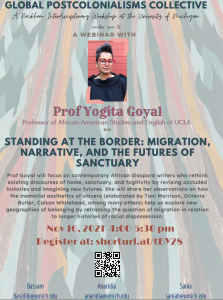Presented By: Department of English Language and Literature
Standing at the Border: Migration, Narrative, and the Futures of Sanctuary, a presentation by Yogita Goyal.

If we were to heed Edward Said’s call to see our age as “the age of the refugee, the displaced person, mass immigration,” we would need to reimage identity, citizenship, and human rights on global and intimate scales. In this talk, I focus on contemporary African diaspora writers who rethink existing discourses of home, sanctuary, and fugitivity by revising occluded histories and imagining new futures. The memorial aesthetics of slavery (elaborated by Toni Morrison, Octavia Butler, Colson Whitehead, among many others) help us explore new geographies of belonging by reframing the question of migration (too often presented simply as a crisis without cause) in relation to longer histories of racial dispossession. While their works are often acclaimed as intervening into discourses of African victimhood or as creative adaptations of the slave
past in the U.S context, they have not been seen as proposing a new language for thinking about borders and citizenship in a frame beyond nation-states. My paper takes up that task, exploring not just the contributions of individual literary works, but examining how their rethinking of political life makes available new and iconoclastic epistemologies of freedom and justice.
past in the U.S context, they have not been seen as proposing a new language for thinking about borders and citizenship in a frame beyond nation-states. My paper takes up that task, exploring not just the contributions of individual literary works, but examining how their rethinking of political life makes available new and iconoclastic epistemologies of freedom and justice.